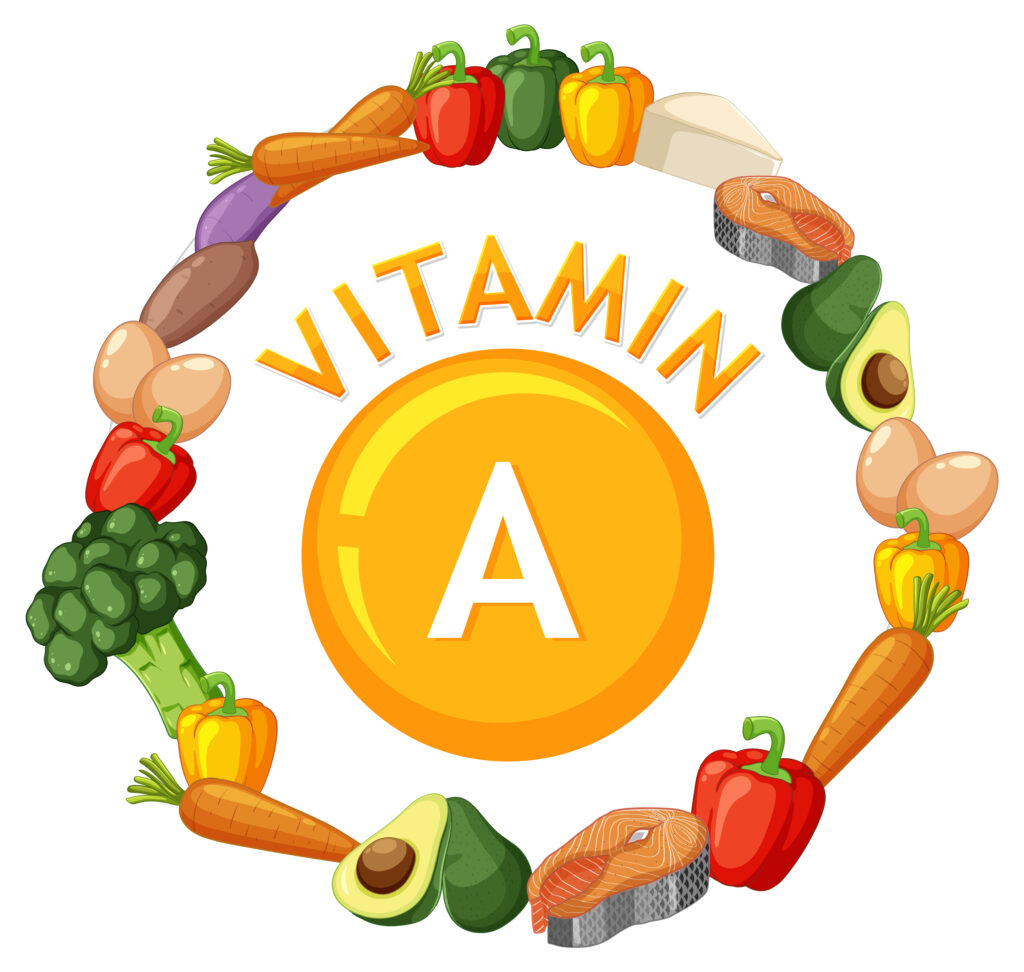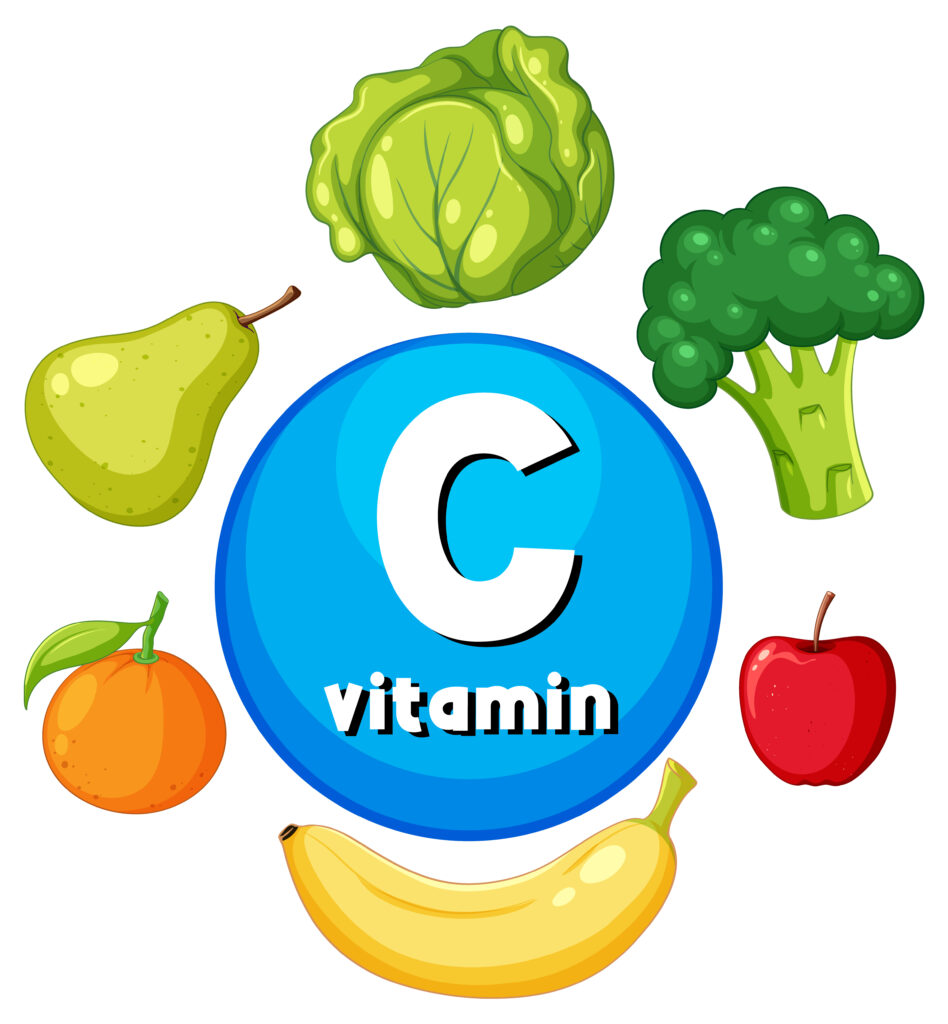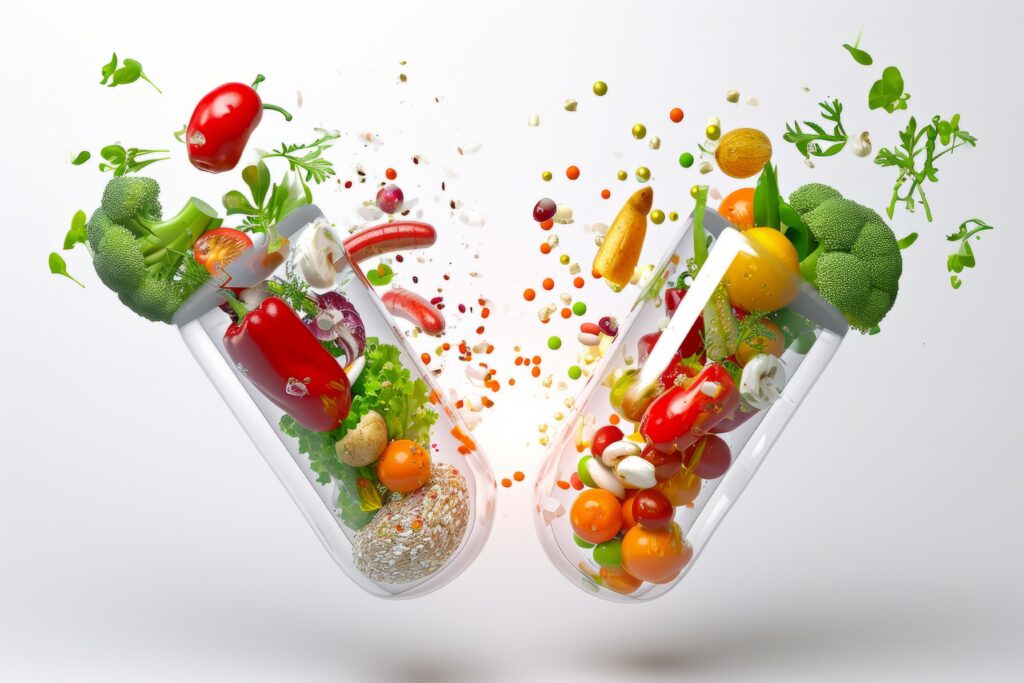Kids have soft, delicate skin and usually more sensitive skin than adults. Their skin is naturally subjected to all the stressors of sun, pollutants, and irritants of the environment every day. It is very important to remember that unlike adult skin, kids’ skin is still developing and needs additional care to keep it in a proper state of health and protection. Supporting kids’ skin health and protection can properly be affected by their nutrition. I believe nutrition has an element of proper vitamins helping to support kids’ skin health by nourishing and protecting from the inside.
Vitamins are crucial to skin repair, hydration, and protection from damage. When kids consume adequate vitamins, through nutrition or supplements, their skin quality improves, becomes stronger, softer, lubricated, and can, therefore, tolerate minor irritants and dryness. Nutrients such as Vitamin A, Vitamin C, Vitamin D, Vitamin E, and minerals (such as zinc and omega-3) are required to build healthy skin cells and natural skin barrier.best vitamins for kids

click here to read amazing post like this
7 Best Korean Vitamin C Serums Experts Swear By for Glowing Skin
7 Best Vitamins for Acne That Clear Skin Fast
10 Asian Fruits That Brighten Your Skin—And 2 You Should Avoid
10 Powerful Fruits That Clear Acne and Brighten Your Skin Naturally
Most importantly, not all vitamins are appropriate for kids. If used carelessly and indiscriminately, some vitamins will damage a child’s skin and harm their body health even at the correct dosage. That is where this guide comes in handy for parents. It is our role as parents to know which vitamins will be beneficial and which ones will be harmful. When we use deliberate judgement about our kids and their skin care now, it will certainly help build opportunities to enjoy a healthier environment in the future.best vitamins for kids
best vitamins for kids
1.Why Does Kid’s Skin Need Special Care
Kids have thinner, more delicate and more sensitive skin than adults. Their skin barrier is still developing and isn’t as resilient as adults. Children’s skin is more at risk of environmental damages, dryness, rashes and infections. Proper nutrition is important to provide support to their body’s natural defence mechanisms, and the vitamins we find in our children’s diet are essential for healthy and glowing skin.
Reasons:
- Thinner layers of skin
- Differently developed barrier
- Sensitive skin
- Higher risk for loss of moisture
With the right amount of vitamin nutrition, you can build their skin barrier, assist with healing and promote ongoing skin health.
2.How Do Vitamins Affect Kid’s Skin
Vitamins are the building blocks to healthy skin. They mostly involved but not limited to
- Collagen
- Replenishing skin cells
- Protection from damaging UV exposure and environmental conditions
- Retention of moisture
- Repair damaged tissues
Internal or topical:
- When taking on board vitamins in the form of food or supplements, the effect will support the skin from the inside.
- Using topicals may have some benefits, but dietary intake of vitamins is usually more important in kids than topical application.best vitamins for kids
Lastly, its important to understand age-appropriate vitamin sources to ensure you are not adversely impacting your child’s health.vitamins for kids skin
The 7 Best Vitamins for Children’s Skin Health
1.Vitamin A: The Skin Repair Vitamin
Benefits: Aids with skin repair, helps to maintain mucous membranes, improves skin’s elasticity.
Sources: Carrots, sweet potatoes, spinach, fortified dairy goods.
Recommended Dosage:
- 1-3 years: 300 mcg/day
- 4-8 years: 400 mcg/day
Pro Tip: Always use food-based sources with limited or no supplement for a high potency.

2.Vitamin C: The Collagen Builder
Benefits: Increases collagen production in the body, improves skin barrier and decreases oxidative stress.
Sources: oranges, strawberries, kiwis, broccoli.
Recommended Dosage:
- 1-3 years: 15 mg/day
- 4-8 years: 25 mg/day
- 9-13 years: 45 mg/dya
Pro Tip: Safe oral-mucosa or topical power, but unlikely or unnecessary for a child.vitamins for kids skin
3.Vitamin D: The Sunshine Vitamin
Benefits: Encourages skin cell growth and repair.best vitamins for kids
Sources: sun, fortified milk, egg yolk, fatty fish.kids vitamins for healthy skin
Required Daily Intake:
400 IU/day, for infants and children
Pro Tip: Achieve a balance between sun exposure with sun protection.
4.Vitamin E: )The Antioxidant Defender
Benefits: Protects skin from oxidative damage while reducing moisture loss from the skin.
Sources: Almonds, sunflower seeds, spinach, vegetable oil.
Recommended amount:
- 1-3 years: 6 mg/day
- 4-8 years: 7 mg/day
5.Vitamin B-Complex: The Multipurpose Group
Vitamin B3 (Niacin): Improves dryness and elasticity of the skin.
Vitamin B5 (Pantothenic acid): Helps heal wounds.
Vitamin B7 (Biotin): Increases keratin production for healthy skin.
Sources: Whole grain, eggs, lean meats, legumes.kids vitamins for healthy skin

6.Zinc: The Skin Healing Mineral
Benefits: Helps healing of wounds, the reduction of inflammation, supports immune function and more.
Sources: Beef, chicken, pumpkin seeds, lentils.
Tip: This mineral is very important, but often goes unnoticed, and has great value for skin health.
7.Omega-3 Fatty Acids: A natural source of moisture.
Benefits: Helps maintain skin hydration by reducing inflammation.
Sources: Fatty fish (e.g. salmon), flaxseeds, chia seeds, walnuts.
Tip: Include 2-3 servings of food high in omega-3’s per week.kids vitamins for healthy skin
2 Vitamins to Never Give Kids for their Skin
1 High-dose vitamin A supplements
Why you should avoid: Too much vitamin A can cause toxicity in kids resulting in nausea, headaches, and liver damage.
Safe practice: Use whole food sources and always check with a child’s pediatrician before suggesting supplements.
2 Vitamin K creams (in doses likely formulated for adults)
Why you should avoid: Adult formulated products like creams may have retinol or in significant quantities are better for adult skin as children’s skin is more sensitive.
Risks: Your child may receive unwanted skin irritation, and in rare circumstances incite allergic responses.
Safe alternatives: Use products approved by pediatric dermatologists.best vitamins for kids

Recommendations for Parents
- To assure total and balanced nutrition, focus on whole meals that include colors, a variety of fruits and vegetables, and lean proteins.
- Don’t use supplements too frequently unless part of a dietitian care plan or physician recommendation.
- Make sure sunscreen is protecting against UV damage and that children are hydrated.
- Pay attention to skin for excessive dryness, rashes or irritation.
- When in doubt about skin, contact your pediatrician, especially if persistent.best vitamins for kids
An example from my plan, which depends on age, health, allergies, is as follows:
Breakfast: fortified cereal + milk + berries
Morning Snack: carrot sticks + hummus
Lunch: grilled chicken + spinach salad + oranges
Afternoon Snack: almonds (except in allergies)
Dinner: baked salmon + brown rice + broccoli or steamed vegetable.
Natural Food Sources Rich in Skin-Healthy Vitamins for Kids
A diet with the right balance is essential in shaping strong, healthy skin for children. If kids eat from different nutrient dense sources, it would be a given that they are getting sufficient vitamins and minerals to support healthy skin structure and function. A focus on whole foods, rather than primary reliance on supplements can help ensure they receive adequate micronutrients.
Vitamin A is essential for skin repair and regeneration. Carrots, sweet potatoes, pumpkin and other orange or yellow vegetables, along with dark leafy greens, such as spinach and kale, are all sources of natural vitamin A. Egg and dairy products are also good sources of vitamin A.best vitamins for kids
Vitamin C is important because it is necessary for collagen production, which supports firmness and elasticity in all skin types. Foods rich in vitamin C include citrus fruits such as oranges, lemons, and grapefruits, strawberries, kiwi, bell peppers and broccoli. All of these contribute to youthful healthy skin.
Vitamin D is important for immune health and skin barrier function. Vitamin D is produced by the body when exposed to sunlight, but can be consumed in a limited number of foods, such as vitamin D fortified milk, eggs, and fatty fish such as salmon.
Vitamin E is an antioxidant that helps protect the skin from damage due to free radicals. Nuts (almonds and hazelnuts), seeds, spinach, and avocados are great natural sources of vitamin E.best vitamins for kids
All B vitamins are essential for skin metabolism and hydration. Biotin and niacin fall within the B2 complex vitamins. Meat, eggs, whole grains, and dairy are all excellent sources of B vitamins.
Zinc is an important mineral for healing and controlling inflammation. Meats, nuts, seeds, and whole grains have varying amounts of zinc in their composition.
Omega-3 fatty acids support skin elasticity and moisture. Fatty fish, flaxseeds and walnuts are good sources of omega-3 fatty acids.
By introducing kids to a colorful array of fruits, vegetables, whole grains, lean proteins and healthy fats, parents can provide children naturally with skin-loving vitamins. Building meals full of fresh ingredients rather than processed alternatives can also support maximum nutrient intake, which benefits skin health for children all the way to adulthood.best vitamins for kids
How kids can maintain healthy skin through hydration
Hydration is essential for skin health, particularly for children. Water helps maintain skin cell flexibility and suppleness, underpins the proper functioning of the skin’s barrier, and flushes away toxins contributing to skin issues.
Children’s bodies can be composed of a higher percentage of water than adults, making hydration more important because children are more vulnerable to dehydration. Skin which is dehydrated will frequently become dry and flaky and can more easily become irritated and infected.best vitamins for kids
With proper hydration, the skin retains elasticity and softness. Adequate water intake on a daily basis is associated with better delivery of vital nutrients to skin cells, which promotes a natural glow and healthier appearance. Hydrated skin can also withstand environmental aspects such as wind, sunlight and pollution more stressfully.
Foods that are made up of a high water percentage, such as watermelon, cucumbers, oranges and strawberries, also contribute to fluid intake. That means kids can eat these fruits and vegetables to meet their fluid goals in a fun, healthy and tasty way.best vitamins for kids
Parents should look out for symptoms to monitor their child’s hydration – dry lips, less urination than they normally have, and also tiredness. A water bottle is important in getting the child to drink enough liquid, especially when they’re playing outside in warmer weather.best vitamins for kids
Hydration works together with vitamins, minerals and nutrients relating to absorption and function in the body. A child can have the best vitamin dosage but if they are not hydrated, they will not be able to derive any benefit from the vitamins- even if it’s for good skin health.
In conclusion, hydration can be seen as a simple and powerful component to a child’s skin health. When combined with a healthy diet and education on how to protect their skin with sunblock, keeping a child hydrated can help a child achieve healthy skin every day of last year’s summer.best vitamins for kids
Diet vs. Supplements: What’s Better for Kids’ Skin?
With respect to kids’ skin health, we often get questions from parents regarding a diet vs. supplementation approach. What is typically better: diet or supplementation for assuring kids receive a better share of vitamins? Each has benefits and restrictions, and knowing these things will help mothers and fathers, and their respective kids, make better decisions.best vitamins for kids
Diet-first: Getting vitamins from actual food sources is usually the safest and most effective way to nourish your child’s skin. Whole foods contain the most complete array of vitamins, phytonutrients, fiber, and antioxidants that will work synergistically, and food is less likely to cause one to overdose than supplements will (and supplements can give vitamins that even sometimes go well beyond daily dose recommendations). Whole foods will also provide vitamins (and other nutrients like fiber) for other health benefits as well, like immune function, normal growth, cognitive function, and skin.best vitamins for kids
best vitamins for kids However, in some instances, a child’s diet may limit access to vitamins from foods, either due to picky eating, allergies, or health conditions that limit their food choices, and it would not be unusual for them to be receiving inadequate vitamins from food sources.best vitamins for kids
best vitamins for kids Supplements: Vitamins in supplement form can be beneficial for addressing nutritional deficiencies, particularly when prescribed by a pediatrician for real deficiencies or educating a family on limitations present due to one particular deficiency of diet. Supplements, will allow more accurate dosing in certain situations and can also be more convenient versus a food option when food is restricted.best vitamins for kids
As with everything related to nutrients and nutrition, there are risks associated with supplements when misused. It is painfully obvious that fat-soluble vitamins can produce toxicities when they are overdosed (vitamin A and vitamin D). Supplements may also include additives or formulations that are unsafe or harmful to children. Therefore, while supplements should not be a replacement for a balanced diet, they can serve as a beneficial complement when necessary.best vitamins for kids
To be succinct, the best course of action in terms of kids’ skin health is to emphasize a nutrient-rich diet laden with sources of vitamins that are naturally found in food. Supplements could be positive additions to kids’ diets when prescribed by a medical professional, but should be recommended with caution. Establishing healthy consumption practices can lead to a lifetime of favorable outcomes for kids’ skin health and overall health.best vitamins for kids
- FAQ’s
Q1: Can kids use topical vitamin serums like adults?
A: While topical vitamin serums are generally safe, doing so will be less beneficial to children than dietary intake. You should always choose a product that states is safe for children.
Q2: Is it safe to provide kids multivitamins for skin health?
A: Yes, it is safe, but check with your pediatrician to avoid excessive supplementation.
Q3: How long until vitamin intake changes a child’s skin?
A: You will notice something in your child’s skin in 4-8 weeks if you are committed to dietary changes.
Q4: Can Vitamin D supplements be used in place of sunlight?
A: Supplements are useful, but safe, small exposure to sunlight is essential for converting Vitamin D to usable form.
Q5: Are natural oils (i.e. coconut oil) good for kids?
A: Yes, natural oils help to moisturize the skin, but should still be patch tested first because of allergies.
conclusion
Caring for kids’ skin is a fundamental part of their overall health and well-being. Children’s skin is thinner and more sensitive than adult skin, which often requires special care, prevention, and nourishment. Vitamins are powerful tools in this process to support the natural functioning of skin, protect skin from damage, and help build healthy skin.best vitamins for kids
In this article, we have examined seven critical vitamins that promote healthy skin in kids. Vitamin A is fully acknowledged as vital for repairing and renewing skin cells. Vitamin C not only aids in collagen production in the body but also protects the skin from oxidative damage. Vitamin D promotes immune health and helps keep skin barrier healthy. Vitamin E acts as an antioxidant and helps protect against the loss of moisture and aids in keeping the skin soft and moist.best vitamins for kids
B-complex vitamins also help with skin metabolism and skin hydration, as well as minerals, like zinc, which help to stabilize inflammation and help patch wounds. Omega-3 fatty acids can support skin nourishment from within while also improving skin elasticity and moisture. Vitamins and other nutrients represent a comprehensive process for healthy, glowing skin in kids!best vitamins for kids
However, it is just as important to be knowledgeable about vitamins and products that can negatively impact your children’s skin. If taken incorrectly, Vitamin A supplements can cause toxicity and skin irritation. Topical Vitamin K options made for adults may have other components that are not appropriate for children and could trigger allergic reactions or other side effects. Parents should always consult a paediatrician prior to introducing any vitamin supplements, or topical products, to their children’s skincare.best vitamins for kids
Along with ensuring vitamin intake, parents should also be following best practices by encouraging a well-balanced diet which includes fruits, vegetables, whole grains, and healthy fats. Protecting children from too much sun exposure, wearing protective clothing, and applying SPF sunscreen and also practicing good hygiene, along with avoiding damaging skincare products will help support their skin health.
Ultimately, taking care of children’s skin means providing an informed nutrition source, gentle, safe, and non-invasive skin care options, and preventing unwanted exposures. With the right vitamins and being conscious, parents can create a foundation of healthy skin educations and habits into their children that can last a lifetime.best vitamins for kids
By learning which vitamins are helpful and which ones to avoid, you are better prepared to support your child’s skin in a safe and effective way. Good skin health means better physical health, and also contributes to your child feeling good and being comfortable in their skin as they develop.best vitamins for kids
Keep in mind that every child is different. It is ok to monitor skin changes and consult a professional if you think it is warranted! It is best to take gentle, age-appropriate care of your child’s skin, and to use vitamins as part of their entire skin health process.best vitamins for kids
In short, your time and attention to your child’s skin health, now, can be an investment in stronger, happier skin in the future. Knowledge and care may help provide your child with the foundation for a lifetime of healthy, glowing skin!best vitamins for kids






One comment on “7 Best Vitamins for Kids’ Skin—and 2 You Must Never Use”